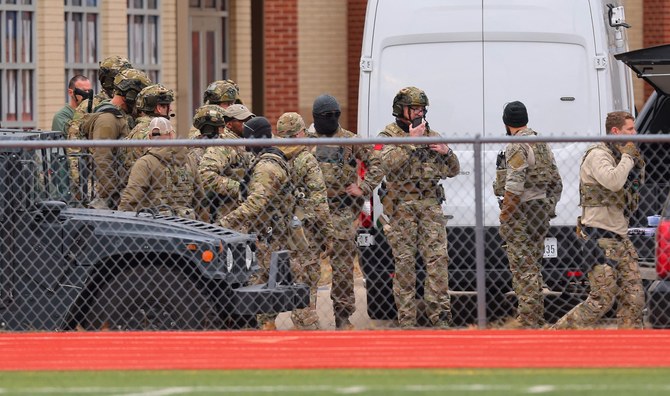KARACHI: The family of a Pakistani neuroscientist jailed in the US denied on Sunday rumors over their relation to a standoff at a synagogue in Texas after American media reports linked them to the hostage taker.
Four people were held hostage at the Congregation Beth Israel in Colleyville, Texas after a gunman entered the synagogue during a Saturday morning service. The suspect was killed and hostages freed in the evening, following a tense standoff with police.
While authorities said they could not yet release the gunman’s identity to the public, US media reported he was motivated by a desire to free Dr. Aafia Siddiqui, who is serving an 86-year sentence on charges of attempting to kill US service members in Afghanistan. Some news outlets said the gunman was Siddiqui’s brother.
The jailed scientist’s family denied the claims.
“False and baseless rumors of my and Aafia’s brother being involved in a hostage situation is another example of how American media and social media trolls jump to blame someone without any proof, especially if that someone is black, brown or Muslim,” Siddiqui’s sister, Dr. Fowzia Siddiqui, told Arab News.

In this file photo, Fowzia Siddiqui, left, sister of US detained Pakistani woman Aafia Siddiqui, speaks during a news conference with her mother Ismat Siddiqui , right, at their house in Karachi on Sept. 23, 2010. (AFP/ File)
She said the rumors came as her mother has been admitted to an intensive care unit.
“Both my brother and I were already preoccupied with her critical condition and this irresponsible reporting comes to add to our anguish,” Siddiqui said. “We are grateful for all the prayers, wishes and trust that our supporters have shown during this trying time.”
The family’s legal counsel in the US, John Floyd, called on the reporters who claimed the synagogue assailant was a member of Siddiqui’s family to correct their reports and issue an apology.
“This assailant has nothing to do with Dr. Aafia, her family, or the global campaign to get justice for Dr. Aafia,” Floyd said in a statement. “Dr. Aafia’s family has always stood firm in advocating for the release of their sister from incarceration by legal and non-violent means only.”
Siddiqui, a 49-year-old mother of three with degrees from the Massachusetts Institute of Technology and Brandeis University, is serving her sentence at the Federal Medical Center in Carswell, Texas after a New York court in 2010 convicted of attempting to shoot and kill in Afghanistan a group of US soldiers and FBI agents who wanted to interrogate her for alleged links to Al-Qaeda.
Siddiqui’s sentencing has riled many in Pakistan, including the government that had campaigned for her release and paid for her legal defense.















